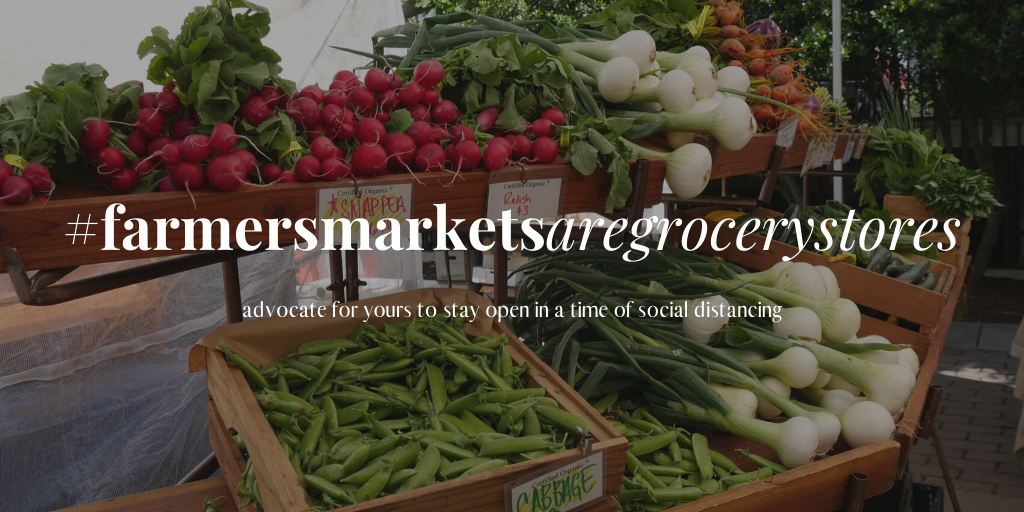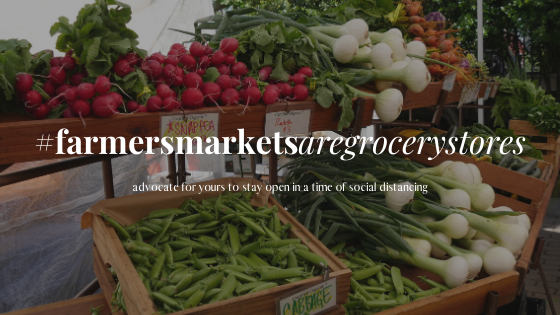by Nick Wood, CFSA Policy Director | Tuesday, Mar. 24, 2020 —

As the response to the Coronavirus quickens and millions of Americans take shelter, basic needs like food and healthcare are more important than ever. Last week, CFSA members and allies reached out to state and local governments in North and South Carolina to make sure that farmers markets can stay open to distribute food, just like grocery stores. According to Homeland Security, those who work in grocery stores and other establishments that provide food to the public are essential workers.
We at CFSA applaud the guidance set forth by the NC Department of Health and Human Services that farmers markets should be treated like grocery stores.
In North Carolina, even as Governor Cooper moves to close more businesses across the state, grocery stores including farmers markets are allowed to remain open.
At this time, all state-run farmers markets remain open in both North and South Carolina, providing critical food access for families and much-needed revenue for farmers. Local farmers markets that remain open must follow the same government rules as grocery stores in terms of social distancing and other practices to avoid the spread of COVID-19 in retail sales locations. The NC Department of Agriculture and Consumer Services has published a helpful set of FAQs on market operations and COVID-19.
Even as NC Governor Cooper moves to close more businesses across the state, grocery stores including farmers markets are allowed to remain open.
We continue to encourage local farmers markets to stay open. Even with state agencies authorizing farmers markets to stay open just like grocery stores, some local governments have closed markets anyway, while other markets have opted on their own to suspend operations. The Durham Farmers Market, a city market, was closed due to a state of emergency declared by the mayor. The Eno River Farmers Market in Hillsborough chose to close on its own in light of the virus and insufficient support from the local governments to enforce proper distancing of market customers. Markets remain open in places like Asheville, Carrboro, Chapel Hill, and Wake Forest and have adopted practices to limit COVID-19 transmission risk for farmers and customers.
If your local government closed or is considering closing the farmers markets in your area, CFSA has a toolkit that you can use to organize your community to keep markets open while reducing the threat of COVID-19 transmission. The situation is changing rapidly, and CFSA will continue to provide you with critical updates and action items as they arise.
Local farmers markets that remain open must follow the same government rules as grocery stores in terms of social distancing and other practices to avoid the spread of COVID-19 in retail sales locations.
Farmers are also getting creative in finding ways to get their products to customers online. Many vendors from closed markets are coming together in small groups to operate multi-farm sales platforms and provide home delivery opportunities. At CFSA, we created this map of farms offering on-farm pickup and delivery options around North and South Carolina. NC Department of Agriculture and Consumer Services is updating its Visit NC Farms app for online and delivery options, and the SC Department of Agriculture and Consumer Service recently launched its own list as well.
As the crisis continues, the challenges to assure people have access to healthy food will only increase. Farmers markets are an essential part of our food system infrastructure, and critical to the viability of thousands of small farms in the Carolinas. For more information check out CFSA’s COVID-19 Farmers Market Advocacy Toolkit.
Want to receive action alerts from CFSA’s policy team in your inbox?
No problem! You can choose to sign-up to receive action alerts for South Carolina, North Carolina, and/or federal issues at any time.


